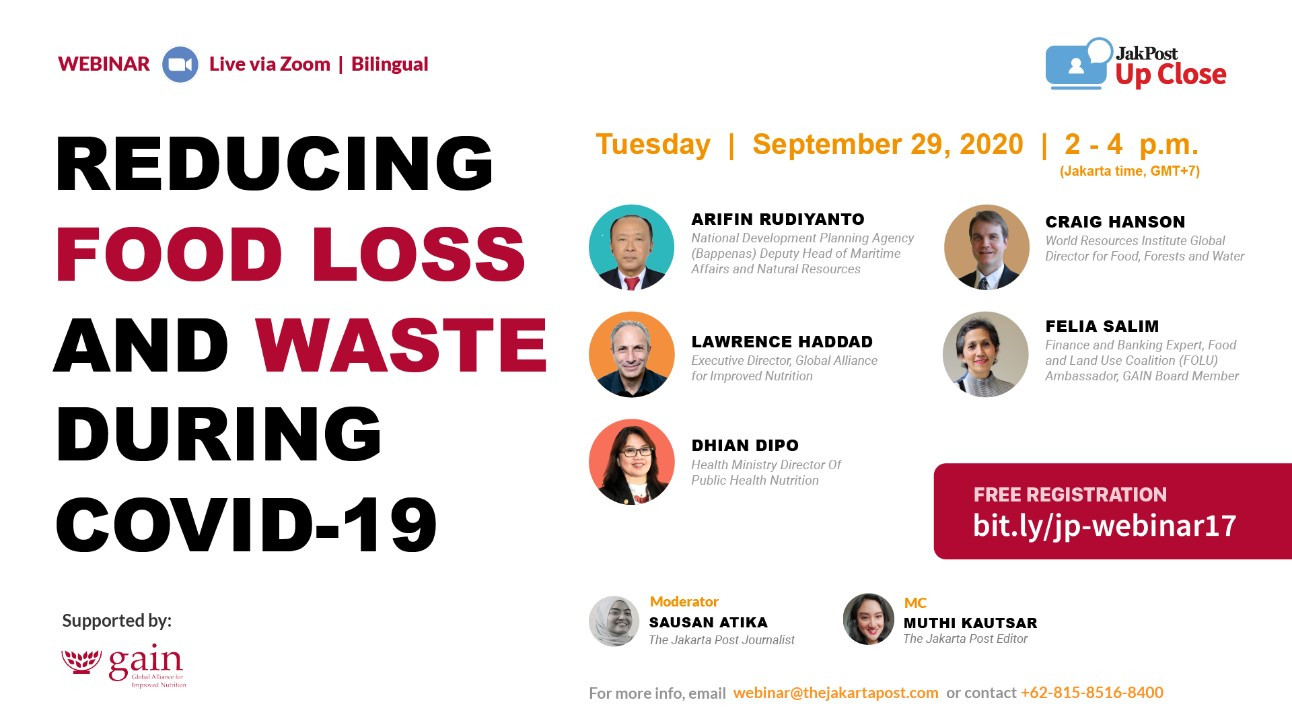Popular Reads
Top Results
Can't find what you're looking for?
View all search resultsPopular Reads
Top Results
Can't find what you're looking for?
View all search resultsReducing food loss and waste during COVID-19
One-third of foods that are produced worldwide are wasted or lost, amounting to about 1.3 billion tons per year.
Change text size
Gift Premium Articles
to Anyone
O
ne-third of foods that are produced worldwide are wasted or lost, amounting to about 1.3 billion tons per year. Based on commodities, food loss and waste from net/farm to fork is estimated at 40 percent for tubers, vegetables and fruits; 35 percent for fish; 30 percent for cereals; and 20 percent for oil seeds, meat and dairy products.
Unfortunately, Indonesia is the second-largest food waster in the world, with 300 kilograms of waste per capita per year, according to the 2017 Food Sustainability Index. And to make matters worse, awareness on food loss and waste in Indonesia is low. As the world remains gripped by the COVID-19 pandemic, the risk of food loss and waste is escalating for a number of reasons, including disruption in supply chains, transportation restrictions and quarantine measures. The Indonesia Fishery Product Processing and Marketing Association (AP5I), for example, reported an 80 percent drop in demand for fishery products, especially for hotels, restaurants and cafés.
With limited access to processing technology and cold chain storage facilities, a huge amount of fresh fish and fish products are wasted, affecting the economics of fishers and other stakeholders working along the fishery supply chain. Similar losses and waste also occur with other perishable products such as fruits and vegetables. However, despite this, demand for nutritious foods and processed foods is increasing. This has challenged food stakeholders to come up with appropriate innovations in processing, distributing and marketing food products to ensure access to food and nutrition.
JakPost webinar on reducing food loss and waste during COVID-19
The Jakarta Post webinar series will discuss issues of food loss and waste. Coinciding with the commemoration of the International Day of Awareness on Food Loss and Waste, which falls on Sept. 29, the series, a partnership between Global Alliance for Improved Nutrition (GAIN) and The Jakarta Post, will feature authoritative speakers, including policymakers, representatives of nonprofit foundations and independent observers, to bring about diverse points of view regarding the matter in order to enlighten the audience on problems, challenges and possible solutions around the issue of food loss and waste.
The series is to highlight some issues, such as:
- The importance of raising awareness about food loss and waste from the perspective of food and nutrition security
- What can be done to reduce the level of food loss and waste in Indonesia
- The urgency for more reliable data on actual food loss and waste in Indonesia
- Creating dialogue and potential alliances and collaborating with stakeholders to raise awareness and address food loss and waste issues at various levels
- Lessons learned from and best practices in other countries around the world in reducing food loss and waste
- Encouraging stakeholders to campaign further and develop public policies on the importance of food loss and waste in improving the lives of children and families in Indonesia
The Zoom webinar will be held bilingually, primarily English, from 2 p.m. to 4 p.m. on Tuesday, Sept. 29, 2020 and will feature:
- Dr. Ir. Arifin Rudiyanto, MSc National Development Planning Agency (Bappenas) Deputy Head of Maritime Affairs and Natural Resources
- Dr. Lawrence Haddad, Global Alliance for Improved Nutrition Executive Director
- Dr. Dhian Dipo, SKM, MA Health Ministry Director of Public Health Nutrition
- Craig Hanson, M.Sc., M.Phil,World Resources Institute Global Director for Food, Forests and Water
- Felia Salim, MA, Finance and Banking Expert, Food and Land Use Coalition (FOLU) Ambassador, GAIN Board Member
Arifin Rudiyanto, a keynote speaker, will share the government’s views on several issues: government efforts and regulatory framework to reduce food loss and waste; progress of food loss and waste reduction and outlook; expectations for and spirit of food loss and waste reduction initiatives and inter-institutional collaboration to reduce food loss and waste and improve food distribution and the welfare of Indonesian children.
Lawrence Haddad will discuss several topics, including the global perspective of food loss and waste issue and lessons learned from countries around the world in overcoming the issue; what initiatives GAIN has conducted in halving food loss and waste; how food loss and waste has exacerbated environmental problems and how to prevent them; insights into how food loss and waste could be reduced while food distribution could be improved for remote, underprivileged areas.
Dr. Dhian Dipo will speak on: the Health Ministry’s findings on the percent of children under the age of 5 and pregnant women who suffer from anemia; what actions the Health Ministry has taken to alleviate chronic malnutrition among Indonesian children; how the reduction of food loss and waste and better distribution of food can help solve malnutrition problems; and the ministry’s initiative to introduce new staple foods, and whether this can prevent food loss and waste.
Craig Hanson will share his insights into countries that have faced food loss and waste issues, and successfully reduced food loss and waste; whether overproducing certain foods is the cause of food loss and waste and whether production needs to be suppressed; and ways for wasted food to be useful, for example for fertilizers.
Felia Salim will share FOLU’s views on whether food and land use in Indonesia has been optimal for producing enough food for the nation; how food loss and waste has affected the Indonesian economy; and opportunities to improve the economy while solving food loss and waste issues.
The JakPost webinar will be useful to government officials from the food and health sector, donor agencies, private sector executives (especially in food, finance, banking, cold chain, logistics), INGO and CSO working on food supply, health/nutrition and the environment, academics, the media and the general public.










